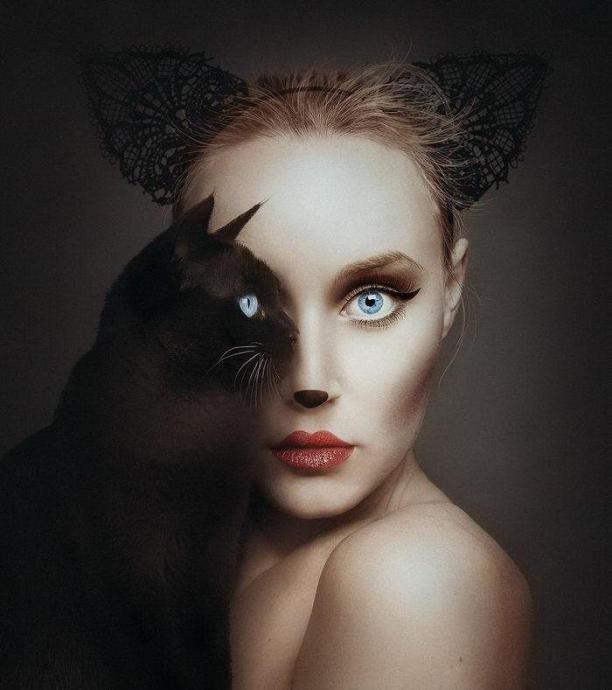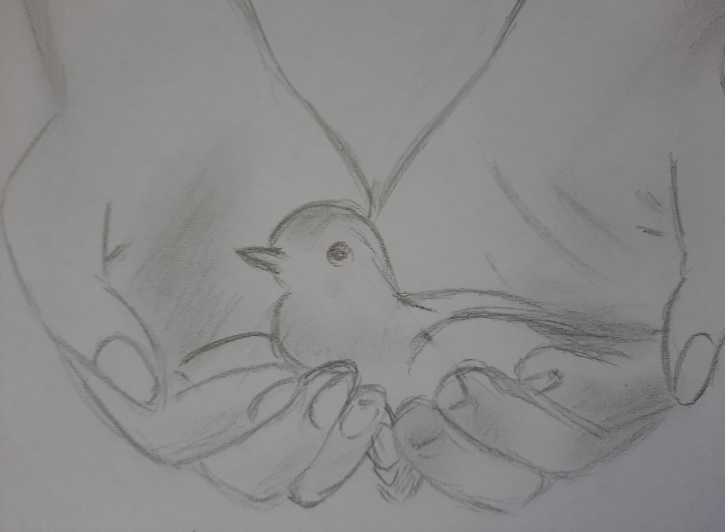For every individual, inspiration arises from different things; however, what is common to everybody is that it gives an artist an idea and enthusiasm and triggers the process of creation. It is difficult to predict where inspiration may lead the creator: it can result in the immediate image of the final product of art or only motivate and direct an individual. In this paper, the connection between a piece of inspiration and the resulting work of art is discussed in detail.

I found the inspiration for my work in a well-known series of self-portraits Animeyed by Budapest-based photographer Flora Borsi. In 2016, Borsi tried to take a selfie with her dog and realized the similarity between her pet’s and her own eyes (Oakley, 2016). This simple discovery became a trigger for several skillful and detailed works where the photographer herself is depicted in the fusion with different animals. Through this technique, she conveys an idea about the unification of a human and the fauna and about the special place that nature and animal world take in people’s lives.

Since the fauna often suffers due to the negligence or cruelty of people, the idea of the connection between animals and humans is especially significant to me. The present photography sketch titled You are in my hands represents the friendship between people and all creatures great and small. The message of the work is that to preserve peace and harmony of the planet, people need to respect their animal neighbors and be kind and helpful towards Mother Nature.
The major thematic connection between the two works is that they represent close interaction between humans and the fauna. Indeed, Ohara et al. (2019) emphasize that photography may help understand the natural world and its role in humans’ life. Josephson et al. (2020) underline that in art, nature is often presented as something pristine, human being a part of it. The idea of the conflict between the purity of nature and the destructive human activity is the basis of many works of art dedicated to the connection between the natural and human worlds.
At the same time, in Borsi’s photo, the animal-human relationship is presented as the fusion of a female and a cat, while the drawing depicts a bird resting in human hands. Borsi emphasizes equality: she accentuates the similarity of eyes, implying that humans and animals being similar by their nature. On the contrary, the drawing mostly underlines the desirable attitude of people towards weaker creatures. In this work, humans and animals are not represented as equal; however, the idea of connection remains, since the bird is depicted as calm and safe in a human’s hands.
Although the pieces of photography convey similar messages, they do not refer to the same medium. Being an object or an idea significant for the whole composition, medium defines the way people perceive the concept of the work and evokes related memories and emotions. Borsi’s photo makes the viewer think about the beauty of the animal world and the similarities between humans and animals. At the same time, the drawing is likely to emphasize the relationship between people and nature and the individual responsibility of every person.
As a surrealist, Borsi paid a lot of attention to the contrasting colors and clear-cut lines of the photo. The sole-colored background of the picture and the position of a female and a cat against each other present a contrast to a more natural composition of the drawing. At the same time, both works are similar in the simplicity of forms and patterns. Therefore, it is fair to say that related ideas may be expressed through different formal elements of design. In conclusion, the two works differ in the way they convey the main message and influence the viewer, which proves the complicated connection between the source of inspiration and the created work.
References
Josephson, S., Kelly, J., & Smith, K. (2020). Handbook of visual communication: Theory, methods, and media. Routledge.
Oakley, R. (2016). Flora Borsi takes self-portraits with the eyes of animals in her series, ‘Animeyed.’ Feature Shoot. Web.
Ohara, N., Yamanaka, Y., & Trencher, G. (2019). Understanding nature through photography: An empirical analysis of the intents of nature photographers and the preparatory process. Environmental Communication, 1–16. Web.